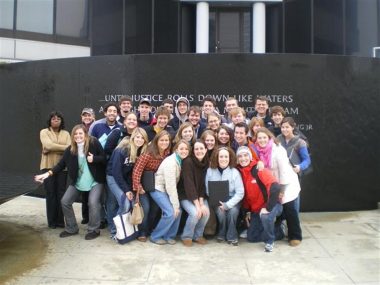The Isabella Cannon Leadership Fellows Class of 2010 recently completed its study of the American Civil Rights Movement by embarking on a week long trip to study the people, places and events that changed the nation.
 Leadership Fellows traveled from Elon to Alabama on Jan. 15 to study the Civil Rights Movement. Under the direction of Frances Ward-Johnson, an associate professor of communications, and Rex Waters, associate dean of students, the Fellows traveled through the Deep South exploring the sights of the Civil Rights Movement for the course “Disarming Injustice: Nonviolence and the Civil Rights Movement.”
Leadership Fellows traveled from Elon to Alabama on Jan. 15 to study the Civil Rights Movement. Under the direction of Frances Ward-Johnson, an associate professor of communications, and Rex Waters, associate dean of students, the Fellows traveled through the Deep South exploring the sights of the Civil Rights Movement for the course “Disarming Injustice: Nonviolence and the Civil Rights Movement.”
Before departing for the trip, the Fellows spent a week and engaging in discussions and reading books about the movement, including “Eating Dr. King’s Dinner” by Chuck Fager, “Cradle of Freedom” by Fred Gaillard and “The Informant” by Gary May. North Carolina A&T State University political science professor Claude Barnes, who marched inthe movement during the 1960s and 1970s, spoke to the class about hisexperiences and the new civil rights movement.
On their trip, the Fellows traveled to Birmingham, Selma and Montgomery, Ala., and then to Atlanta. They visited the Birmingham Civil Rights Museum, the 16th Street Baptist Church (sight of a bombing that killed four girls) and Kelly Ingram Park (sight of Bull Connor’s violence against children). They traveled to Selma and toured the Slavery and Civil War Museum and the National Voting Rights Museum.
Fellows also walked across the Edmund Pettis Bridge (sight of Bloody Sunday). On their way to Montgomery, they traveled the route used by the Rev. Dr. Martin Luther King Jr. and hundreds of protesters during the March on Montgomery for voting rights.
In Montgomery, the students were able to stand where King led a protest for voting rights, which happened to be the same spot Jefferson Davis was inaugurated as President of the Confederacy. They also toured Dexter Avenue Baptist Church’s Parsonage (where King lived with his family; also the house which was bombed to try and kill King), the Rosa Parks Museum and the Civil Rights Memorial, located adjacent to the Southern Poverty Law Center, where speakers elaborated on the injustice and racism that they said continues today.
“Going down to Alabama I noticed that, politically and socially, there are documents saying things have changed, but realistically it is the same,” said Elon sophomore Hunter Gros.
After traveling to Atlanta, the Fellows were unable to tour the Martin Luther King Jr. Memorial Site due to weather. However, the Memorial contains a museum, the King Center and Freedom Center, his grave site, his birthplace and Ebenezer Baptist Church, site of King’s funeral.
“The readings taught me about the movement and the actual places illustrated just how real it all is,” said Elon sophomore Lindsay Wagner. “I thoroughly enjoyed my Winter Term and constantly find myself telling people about the movement. It is the very first class at Elon where the material has truly inspired me and made me think beyond class discussions.”
– Article submitted by Rex Waters


